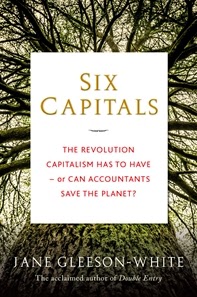 Staff Review by Chris Saliba
Staff Review by Chris SalibaIn Six Capitals, Jane Gleeson-White explores how corporations are learning to think in terms broader than simple profit and loss.
A book about accounting and accountants sounds dull as dishwater, but Six Capitals is anything but. Part financial history and part journalistic investigation, Jane Gleeson-White tells the story of a new accounting paradigm that is currently emerging in the world of finance and business. The medieval merchants of Venice created the accounting system known as double entry, which involved accounting for debits and credits in mercantile transactions. Anyone today who can read their own bank or credit card statement knows how this system works. This mode of computing profit and loss has since then ruled the world of business with an iron fist. We all now think of business in terms purely of its financial position, never considering other worthy forms of capitalisation in a business.
This is where the idea of the six capitals comes in. Besides the traditional financial and manufactured capital, there are four new ones that are now starting to be considered on a business’s balance sheet: intellectual capital (intellectual property and knowledge held by employees), human capital (skills, experience, loyalty to the company), social and relationship capital (common values, trust the company has created with its customers) and natural capital (air, water, minerals, forests, biodiversity).
Jane Gleeson-White documents in fine detail the emergence of these new accounting systems that take into account all of the above mentioned six capitals. Taken together, this is called integrated reporting. For example, a company might make lots of money, but if its business also degrades the environment substantially, then an honest account of this would show up in the company’s integrated reporting. Amazingly, the footwear company Puma did just this, issuing an environmental profit and loss statement, showing how much it had used and degraded the environment.
Integrated reporting, using the six capitals model, isn’t really a burgeoning revolution. As you read, you find it hard to believe that all huge companies are going to come on board and honestly evaluate how much they use and abuse their staff and the environment. Yet from the broad movements in this direction that Gleeson-White reports in Six Capitals, she does give reason for optimism. As she shows from various corporate disasters, it might be better financially in the long run for these companies to take a more holistic look at their operations. The BP oil spill of 2010 is a good example of the dangers of short term thinking.
The feeling you get from reading Six Capitals is that the all powerful corporations (the book provides an excellent short history of the modern corporation) are getting a bit sick of their own narrow minded vision and can no longer lie to themselves about the danger they’re doing to the environment and the public at large.
In the end, Six Capitals reads as almost an environmental treatise dressed in accountant’s clothing. It asks us to expand our imagination and think outside of the simplistic profit / loss paradigm. Ironically, it suggests that it’s through accounting that we can learn some spiritual lessons about our human connection to the environment.
Six Capitals: The Revolution that Capitalism Has to Have, or Can Accountants Save the Planet?, by Jane Gleeson White. Published by Allen and Unwin. ISBN: 9781743319161 RRP: $32.99
To sign up for our monthly newsletter, featuring new releases, book reviews and favourite articles from around the web, click here.
No comments:
Post a Comment